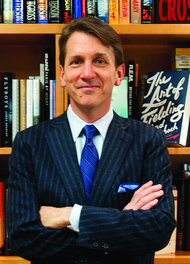 Michael Pietsch
Michael Pietsch
2:41 p.m. | Updated Michael Pietsch, the publisher of Little, Brown and Company and a hands-on editor known for his work with both literary titans and mass-market commercial authors, has been named chief executive of the Hachette Book Group.
He will replace David Young on April 1, the company announced Monday.
A gregarious, well-liked figure at Hachette who has held his current position since 2006, Mr. Young has successfully brought the company up to speed digitally while navigating relations between the Hachette Book Group and its corporate parent, Hachette Livre, a publishing company based in France.
For months, Mr. Young, 61, has told associates that he was ready to leave his post and join his family outside London, where his wife, the novelist Elizabeth Noble, and their three children have been living for two years.
“I realized that despite loving this job, I couldn’t bear being separated from my family much longer,” Mr. Young said in an interview at the Hachette offices in Manhattan on Monday.
In March, he told Arnaud Nourry, the chairman of Hachette Livre, that he intended to step down in a year.
Mr. Pietsch, 55, is a natural successor from within Hachette, which owns Little, Brown. He has edited literary novelists like David Foster Wallace as well as blockbuster authors like James Patterson.
Asked how long it took Mr. Nourry to find Mr. Young’s replacement, Mr. Nourry said, “It took me about a minute and a half.”
“Frankly, I did not meet with anyone but Michael,” Mr. Nourry said.
Mr. Pietsch said he accepted the job “after two deep breaths.”
“It’s a bigger transition than I’ve ever made,” he said. “The job of C.E.O. is much bigger than the job of a publisher. I get to drive the Maserati that David has built.”
The succession plans call for Mr. Young to retain the position of chairman of the Hachette Book Group, spending about one week a month in New York. He will also take on the role of deputy chief executive of Hachette UK and chief executive of the Orion Publishing Group, a division of Hachette UK.
Mr. Pietsch, who will report to Mr. Young, will be responsible for leading the company through the digital transition that is changing the industry. But his first task will be finding his own replacement as publisher of Little, Brown. He said his search would include candidates from outside the company.
Several executives within Hachette said that the differences in management style between Mr. Young and Mr. Pietsch were stark: while Mr. Young is known as charming and accessible, Mr. Pietsch can be more difficult to approach, they said.
He is also a publisher who is deeply involved in content and comfortable with the arcane details of a manuscript, skills that may be less important in his broader role overseeing Hachette’s direction and profitability.
Mr. Pietsch has published some of the biggest authors in the business, including Martin Amis, Michael Connelly and Stacy Schiff, and worked on memoirs by Keith Richards and Chuck Berry.
He edited “The Pale King,” the posthumously published novel by Mr. Wallace that was a finalist for the Pulitzer Prize for fiction this year. Mr. Pietsch assembled the book after Mr. Wallace died in 2008.
This month, Little, Brown will release “The Casual Vacancy,” J. K. Rowling’s first novel for adults, a major acquisition for the imprint. Mr. Pietsch also lured the novelist Tom Wolfe away from his longtime publisher, Farrar Straus Giroux, paying him close to $7 million for “Back to Blood,” which will be released in October.
Mr. Pietsch has been with Little, Brown since 1991 and previously worked at Harmony Books and Scribner.
According to the company’s Web site, the Hachette Book Group publishes close to 650 adult books and 125 young adult and children’s books every year. In its quarterly report announced late last month, Hachette said its revenues were down 4 percent because of weak sales of newly released books. The company said it expected the second half of 2012 to be strong enough to reverse the sales trend.
This post has been revised to reflect the following correction:
Correction: September 10, 2012
An earlier version of this post misstated the month Tom Wolfe’s novel “Back to Blood” will be released. It is October, not November.
Article source: http://mediadecoder.blogs.nytimes.com/2012/09/10/pietsch-of-little-brown-will-become-new-hachette-chief-executive/?partner=rss&emc=rss